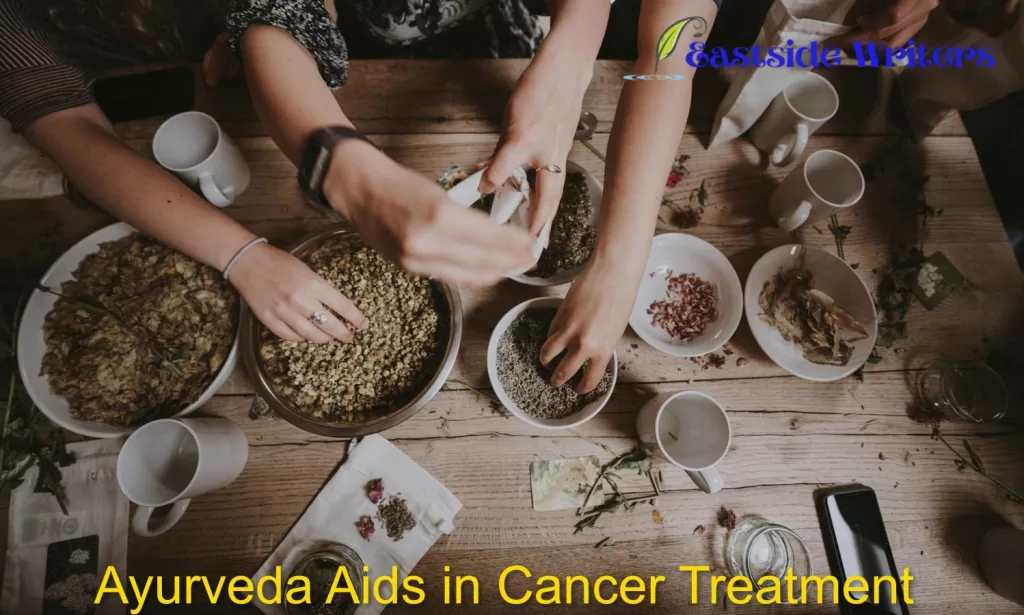Cancer is a terrifying illness that develops suddenly. There is no known cause of cancer and no known treatment for it. Therefore, prevention in this instance is preferable to cure. No matter what kind of cancer you have, your risk can be greatly decreased by taking precautions and altering your lifestyle. An ayurvedic diet for cancer is frequently suggested by experts.
Many people who have turned to Ayurveda for an alternative form of treatment now have hope thanks to the recent report that AIIMS plans to collaborate with the Central Council for Research in Ayurvedic Sciences, the All India Institute of Ayurveda, and other organizations to explore the possibility of treating cancer with Ayurvedic drugs.
Ayurveda, as we all know, contains a variety of treatments that have been successfully treating people’s health issues for ages. Even though many people say it can also treat cancer, there isn’t enough scientific research to know for sure.
Different medical centers are using ayurveda along with radiotherapy and chemotherapy to lessen the bad side effects. In a pilot study done by AIIMS, it was found that Ayurvedic medicines helped breast cancer patients feel much better. More than 5000 years ago, Ayurveda was developed in India, but modern science and allopathy today adhere to its fundamental principles, and more and more study is being done on antiquated plants and natural remedies. The road to a healthy way of life is provided by ayurveda.

According to Ayurveda, good health results from an ideal balance of the mind, body, and consciousness. This is done by encouraging daily physical activity, emotional stability, and a well-balanced diet. This is a great way to stop a lot of lifestyle diseases from happening on their own. A growing body of scientific research supports the use of a variety of medicines recommended by Ayurveda for cancer prevention.
Here are a few common herbs with demonstrated anti-cancer qualities
1. Amla
Ayurvedic superfoods include amla. Because it has a lot of quercetin, phyllaemblic compounds, gallic acid, tannins, flavonoids, pectin, and other polyphenolic compounds, it is called the “king of rejuvenation.” It is also one of the greatest sources of Vitamin C. The traditional use of amla has been validated by three decades of scientific research. In tests in the lab, amla extracts have shown that they can kill cancer cells and stop their growth without hurting healthy cells.
2. Garlic,
Flavonoids, selenium, arginine, and sulfur are all present in garlic. When the bulb of garlic is cut or crushed, allicin is changed into chemicals that are good for you. According to the European Prospective Investigation into Cancer and Nutrition (EPIC), a 10-country international study that is still going on, garlic and onions are linked to a lower risk of cancer.
Consuming garlic is linked to a lower risk of cancer, according to studies from the US, China, and France. Garlic is a well-known antibacterial agent that can stop chemicals that cause cancer from being made and activated. For adults, the World Health Organization suggests consuming at least 2 to 5 grams, or one bulb, of garlic daily.
Garlic is a popular food supplement for people with cancer because of its powerful anti-cancer qualities. S-Allylcysteine, an antioxidant with cholesterol-lowering effects, is one of the organosulfur compounds found in garlic. This substance slows the spread of cancer by getting in the way of the cell cycle of cancer cells.
Garlic contains selenium, which helps to stop premalignant lesions or aberrant tissues that could turn cancerous. Garlic has properties that stop cancerous cells from growing by killing the ones that are dividing. Garlic contains a different chemical called diallyl trisulfide, which is powerful against colon cancer cells.
Turmeric

For its potential to fight cancer, haldi, or turmeric is one of the most studied herbs. It is said to have antioxidant, analgesic, anti-inflammatory, and antibacterial properties. The main chemical in turmeric is called curcumin. It is a powerful antioxidant that can get rid of free radicals and stop cancer cells from growing. Curcumin has been shown in over 2000 published scientific articles to have the ability to kill cancer cells while not harming healthy cells.
Biomolecules made from turmeric may stop bone cancer cells from growing and help healthy bone cells grow. Turmeric contains the polyphenol curcumin, which has antioxidant and anti-inflammatory characteristics that can slow the spread of cancer.
Even though more research is needed to find out exactly how turmeric helps fight cancer, it is still a healthy addition to your diet. Using these herbs regularly in your diet not only lowers your risk of getting cancer but also makes you healthier overall.
Ashwagandha
It is also called Indian ginseng and has been used in Ayurveda to help the body deal with stress. About 40 years ago, when scientists took a crystalline steroidal molecule (called withaferin A) from this herb, they found that it helped fight cancer. More research on these extracts, which were taken from the leaf of the ashwagandha plant, showed that they could kill cancer cells.
Cinnamon
This holy plant, also called Tulsi in India, is well-known for its curative properties. It is used to boost immunity and combat stress. Through research, it has also been shown to be anti-inflammatory, analgesic, anti-diabetic, and anti-stress. Studies show that the phytochemicals in tulsi stop the growth of lung, liver, oral, and skin cancers by increasing antioxidant activity, changing gene expression, and killing cancer cells. They also reduced the transmission of the disease to other cells.
Ginger
The use of ginger as a medicine dates back more than 2,000 years. The active ingredients in ginger have strong anti-inflammatory, anti-oxidant, and cancer-prevention capabilities. Some have even shown this activity in experimental settings. Numerous studies have been conducted recently that support ginger’s ability to prevent cancer. A University of Michigan study found that ginger killed ovarian cancer cells. According to a different study that was published in Cancer Prevention Research, colon inflammation was lessened.
India has a long history of using ginger to treat conditions like fever, colds, nausea, and menstrual pain. Ginger’s active ingredients can efficiently slow down different forms of cancer. Since chemopreventive properties are known to be in ginger extracts, they can be used to kill cancer cells.
According to reports, ginger has a huge role to play in both preventing and treating gastrointestinal cancer. The ginger-derived chemical zerumbet exhibits anti-inflammatory and anti-tumor effects. As a result, stomach cancer cells are unable to divide and develop. Gingerol, which is a strong part of ginger, can also stop the growth of liver and pancreatic cancer.
Chinese Gooseberry

Indian gooseberry, also known as amla, is a popular fruit that is high in antioxidants that support the immune system and cell healing. Amla extracts can kill cancer cells by making them go through a process called apoptosis. This can stop tumors from growing. The breast and ovarian cancer cells can’t grow because the polyphenol-rich extracts are toxic to them. Amla, which is full of the powerful antioxidant ellagic acid, helps keep breast and prostate cancer from happening.
Periwinkle
Periwinkle is also known as Sadabahar and Nayantara in India. Periwinkle is a plant whose roots, stem, leaves, flowers, and extracts have long been used in Ayurveda to cure diabetes, bleeding, and insect stings. Modern medicine uses periwinkle’s alkaloids as immunosuppressive and anti-tumor medicines. These alkaloids have a crucial role in chemotherapy. These alkaloids inhibit the growth of cancer cells and kill them.
Saffron
In Ayurvedic medicine, saffron is used to treat skin problems, colds, asthma, and arthritis. It is also used to add flavor to food. Crocin, which is found in saffron, is bad for blood and prostate cancer cells and slows their growth. Crocetin is another part of saffron that helps treat breast, ovarian, and cervical cancer by stopping the cell cycle from continuing in sick cells. Saffron is useful for treating skin cancer due to its anti-cancer effects.
Black pepper
Piperine is the active ingredient in black pepper, which is a berry. Piperine is a chemical that occurs naturally and is a powerful antioxidant. Researchers at the University of Michigan Comprehensive Cancer Center discovered that pepper and turmeric both slowed the growth of breast tumor malignant stem cells in a study that was later published in the journal Breast Cancer Research and Treatment. Healthy cells weren’t destroyed by the spice, though.
Not only does the above compound keep us warm, but it also does some amazing things inside our bodies to prevent cancer. It has a lot of “piperine,” which is an antioxidant that works well with turmeric to stop cancerous cells from forming. Thus, adding some black pepper to your diet to spice things up is a good idea.
Aloe Vera
The calming effects of Aloe Vera gel are well known, and the plant extract is a powerful anti-inflammatory that slows the spread of cancer. It also has a lot of “acemannan,” which is a type of polysaccharide that studies have shown can kill cancerous cells. To reap the benefits of aloe vera, consume edible aloe extracts every morning.

Oregano
More than just a pizza or pasta seasoning, oregano proves its value as a potential prostate cancer treatment. Just one teaspoon of oregano has the anti-microbial properties of two cups of red grapes! Quercetin, a phytochemical found in oregano, inhibits the formation of cancerous cells in the body and functions as a medication against cancer-related illnesses.
Coriander
Antioxidants included in this herb counteract cancer-causing free radicals in the blood. This herb contains the substance “Apigenin,” which is a powerful weapon against blood cancer. Don’t forget to add coriander leaves and shoots to your dinner the next time you’re in the kitchen. Another excellent choice to think about is the coriander chutney.
Sacred Basil
The holy basil, which is also called the beloved tulsi, has a lot of health benefits and has been used a lot in India for hundreds of years. According to studies, eating a few raw tulsi leaves every day can both stop the spread of cancer and prevent it from starting.
Cayenne Pepper (Chili Peppers)
Chilli peppers are a promising spice with anti-cancer qualities, but too much of them should be avoided. Capsaicin causes the apoptosis process, which kills potential cancerous cells and significantly shrinks leukemia tumor cells. It can be established that chili peppers have additional benefits than igniting our tongues, such as scaring away cancer-causing bacteria.
The Benefits of Ayurveda Over Allopathy

Cancer is an incurable illness. Discovering a treatment is really difficult. Radiation, chemotherapy, and surgery are allopathic treatments. These treatments all come with a long list of unpleasant side effects that are worse than the sickness itself. Contrary to ayurvedic science, which attempts to strengthen the immune system, chemotherapy and radiation both reduce immunity.
Ayurvedic medicine can be used to treat complex cancer cases without causing any bad side effects. The ayurvedic doctor will recommend the right course of ayurvedic medicine after certain tests have been done to find cancer. For such patients can have a better quality of life by eating the right foods and taking ayurvedic herbs.
Cancer patients may get better from ayurvedic treatment if they get rid of the poisons and free radicals in their bodies. It makes organs work better and helps them work again. It also changes the conditions in which cancer cells can grow. Ayurvedic drugs boost immunity, which kills cancerous cells.
Ayurvedic principles say that people with cancer can get good care if the changes in their Dosh, Dhatu, Mal, Updhatu, and Oaj are well understood. Before designing a treatment plan, a number of elements are taken into account, including the patient’s diagnosis, the cause of cancer, which dosh and dhatu are damaged, etc.
Commonly asked questions?
1) Are there any steroids in the herbal remedies?
No, we don’t engage in such dishonest or unethical behavior. My medications are open to testing, and, for that matter, to any kind of testing.
2) What exactly is chemoprevention?
Chemopreventive drugs, according to cancer specialists, can stop, slow, or slow the spread of cancer. They can be either man-made or made from natural ingredients. According to them, many chemopreventive substances and practices are recommended for both cancer patients and those who do not have it.
3) Can ayurvedic treatment avoid surgery and radiation?
You’ll all be surprised to learn that the 3000-year-old science of Ayurveda clearly states that the first step in its treatment is to remove it surgically and then “burn” the margins. This idea is comparable to the modern protocol of surgery followed by radiation. So, a skilled oncosurgeon should quickly remove any tumor that can be operated on.
4) Are these medications safe when receiving chemotherapy?
Several studies, some of which were published in reputable journals, have shown that chemotherapy and herbal medicine work well together. (Care must be taken to make sure that any herbal medicine is of standard quality, and it shouldn’t be given on the same day as injectable chemotherapy, though it might be.) It also depends on the stage and type of cancer. Because of this, the decision should not be made until all the pros and cons have been carefully weighed.
Clinical studies have shown that curcumin and ashwagandha work better when they are mixed with chemotherapy in standardized herbal formulations. When curcumin, ashwagandha, and Tinospora cordifolia are taken as supplements, many chemoresistant tumors respond quite favorably.
5) Can herbal therapy be used instead of or in addition to chemotherapy?
No, one should adhere to the full current regimen. As was already said, herbal medicine is often used with chemotherapy to help the immune system and mitochondria work better.

Conclusion
Cancer is viewed as a lethal and challenging illness. It is a sickness that is known to spread rapidly and harm the organs and tissues nearby. When toxins build up near an organ over time, they may cause the cells around that organ to grow in a way that is fatal. Cell clusters gather and cause edema at the location. If the toxins are not eliminated, the damaged cells spread to other parts of the body through the bloodstream, harming nearby cells and tissues as well. The goal of ayurvedic cancer treatment is to boost the immune system and improve the patient’s quality of life.
Disclaimer: This information is for educational purposes only, and no medical advice should be inferred from it. Before changing your diet or adding supplements, please talk to your doctor.
The author’s views are his or her own. The facts and opinions in the article have been taken from various articles and commentaries available in the online media and Eastside Writers does not take any responsibility or obligation for them.
Note: Contact our Writers at www.eastsidewriters.com for writing Blogs/Articles on any niche. We have experts in various domains from Technology to Finance and from Spirituality to Lifestyle and Entertainment.







Pingback: Keeping Your Teeth and Mouth in Good Shape
Pingback: Learn the 12 proven methods To Reduce Obesity without any side effects - Eastside Writers
Pingback: Amazing Goodness Of Green Tea On Your Health And Wellness - Eastside Writers
Pingback: Why CoQ10 Is The Drug Of Choice For Many When It Comes To Health Management - Eastside Writers
Pingback: The Sweet Science: Exploring the Benefits and Secrets of Honey - Eastside Writers
Pingback: The Silent Thief of Oxygen: Exploring the Causes, Symptoms, and Treatments of Anemia - Eastside Writers
Pingback: Silent but Deadly: Unmasking the Menace of Prostate Cancer - Eastside Writers